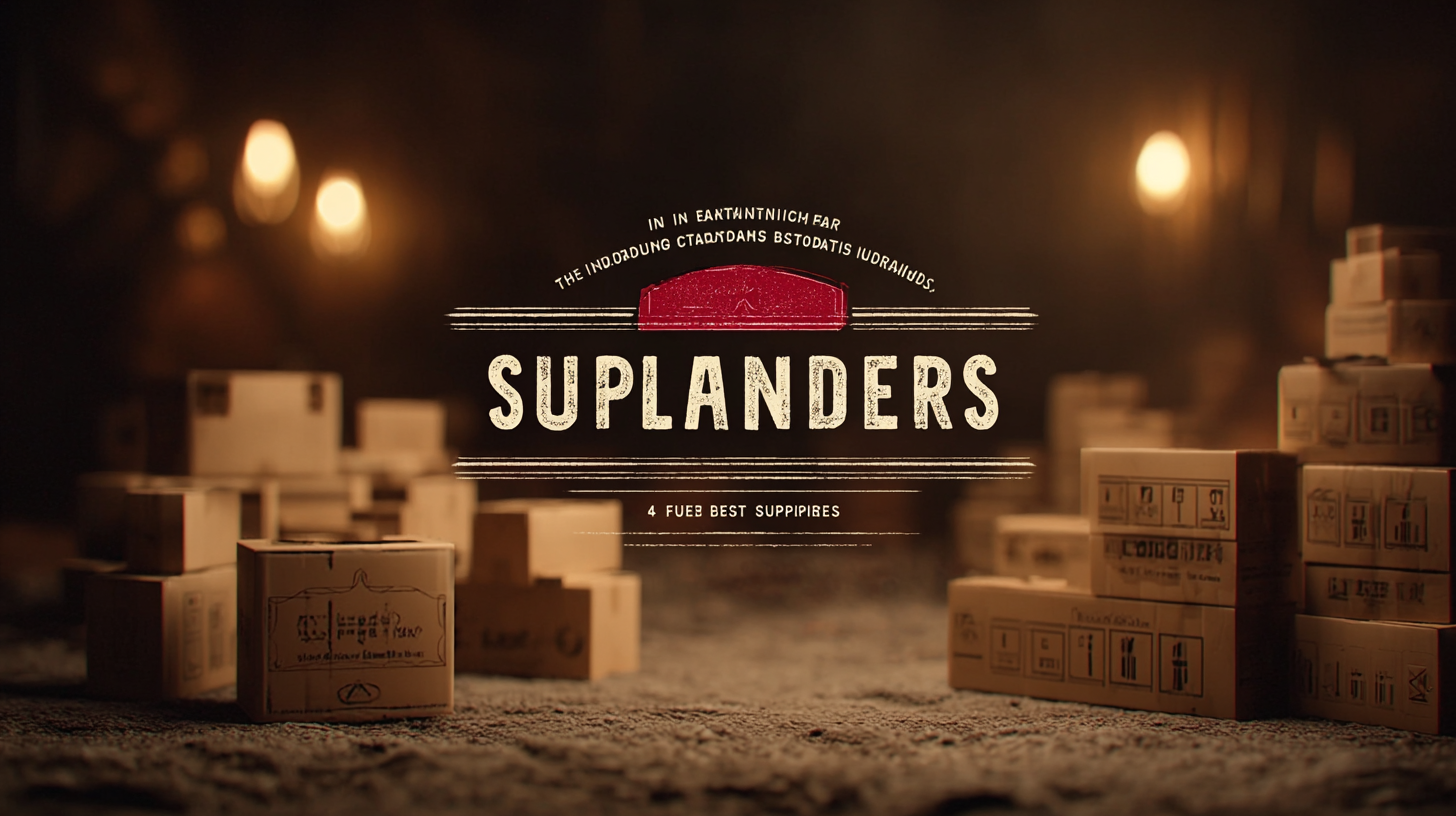
Understanding Industry Production Standards for Selecting the Best Suppliers
In today's competitive market, selecting the right suppliers is crucial for maintaining product quality and operational efficiency. According to a recent report by the Institute for Supply Management, 79% of organizations believe that their success is directly influenced by the reliability of their suppliers. Understanding industry production standards becomes paramount when assessing potential suppliers, particularly in terms of after-sales service advantages and repair costs. A study from the Global Supply Chain Institute reveals that companies with effective supplier evaluation processes can reduce repair costs by up to 25%. By meticulously analyzing these factors, businesses can not only improve product performance but also drive customer satisfaction, ultimately leading to a stronger market position. Hence, the importance of suppliers in shaping a company's operational landscape cannot be overstated.

Key Factors in Industry Production Standards to Consider for Supplier Selection
When selecting the best suppliers for your business, understanding industry production standards is crucial. These standards serve as benchmarks to assess the quality and reliability of potential suppliers. Key factors to consider include compliance with safety regulations, production capacity, and quality control measures. Ensuring your supplier adheres to established standards can significantly impact your product's overall quality and your brand's reputation in the market.
Tips: Always verify a supplier's certifications related to industry standards before making any commitments. Look for suppliers who have a proven track record in maintaining compliance with these standards. Additionally, consider conducting site visits to evaluate their production processes firsthand. This not only helps build trust but also allows you to gain insight into their operational capabilities.
Another important factor is the supplier's commitment to continuous improvement. Evaluate their history of adapting to changes in production techniques and standards. Suppliers who invest in innovation are more likely to provide better quality products over time, contributing positively to your business’s growth. Ensure that your chosen partner shares your values when it comes to sustainability and social responsibility, as these aspects are increasingly important in today’s market.
Understanding Industry Production Standards for Selecting the Best Suppliers
| Criteria | Standard Type | Importance Level | Compliance Rate (%) | Notes |
|---|---|---|---|---|
| Quality Control | ISO 9001 | High | 95 | Essential for product reliability |
| Environmental Standards | ISO 14001 | Medium | 90 | Minimizing environmental impact |
| Health & Safety | ISO 45001 | High | 98 | Protecting worker safety |
| Production Efficiency | Lean Manufacturing | Medium | 85 | Optimizing resource usage |
| Supply Chain Transparency | Traceability Standards | High | 93 | Ensuring ethical sourcing |
Comparative Analysis: Evaluating Supplier Compliance with Production Standards
When evaluating potential suppliers, understanding and analyzing their compliance with industry production standards is crucial for ensuring product quality and sustainability. A comprehensive comparative analysis allows businesses to systematically assess how well each supplier adheres to established standards, encompassing aspects such as quality control, safety regulations, and environmental impact. By creating a template or matrix to evaluate these factors, companies can effectively identify which suppliers meet or exceed expectations, thereby minimizing risks associated with subpar production practices.
Furthermore, observing how different suppliers align with industry benchmarks can shed light on their operational efficiencies and ethical practices. For instance, a supplier that consistently adheres to regulations not only demonstrates reliability but also a commitment to corporate social responsibility. This is particularly important in an era where consumers and partners increasingly prioritize ethical sourcing and sustainability. As firms become more discerning in their supplier selection, incorporating these comparative analyses into the procurement process is essential for building strong and responsible supply chains.
The Role of Certifications and Qualifications in Supplier Selection
 When selecting suppliers, certifications and qualifications play a crucial role
in ensuring that the products and services meet industry standards. Certifications from recognized bodies provide
validation of a supplier's ability to deliver quality and comply with regulatory requirements. For instance,
ISO certifications are a benchmark for organizations looking to establish credibility in their
production processes. These certifications not only indicate a commitment to quality but also help mitigate risks
associated with subpar suppliers.
When selecting suppliers, certifications and qualifications play a crucial role
in ensuring that the products and services meet industry standards. Certifications from recognized bodies provide
validation of a supplier's ability to deliver quality and comply with regulatory requirements. For instance,
ISO certifications are a benchmark for organizations looking to establish credibility in their
production processes. These certifications not only indicate a commitment to quality but also help mitigate risks
associated with subpar suppliers.
Moreover, qualifications such as industry-specific accolades or government-approved licenses enhance a supplier's reputation and reliability. Companies that invest in acquiring relevant certifications often demonstrate a proactive approach to maintaining high standards, which can foster trust and long-term partnerships. Additionally, evaluating suppliers on their qualifications ensures that buyers are not only looking at cost but also the value and assurance of quality that certified suppliers can provide.
This strategic approach can significantly impact the overall efficiency and sustainability of supply chains in any industry.
Building a Sustainable Supplier Relationship through Industry Standards
Building a sustainable supplier relationship hinges on a clear understanding and adherence to
industry production standards. These standards act as a blueprint for quality, safety, and ethical practices, ensuring that suppliers fit seamlessly into your operational framework. By aligning with suppliers who are not only aware of but also compliant with these benchmarks, businesses can foster a reliable supply chain that minimizes risks and enhances product integrity.
Moreover, consistent communication about these standards creates an environment of transparency and trust. When suppliers understand the expectations set forth by industry standards, they are more likely to feel valued and engaged in the partnership. This collaborative atmosphere encourages ongoing feedback and improvement, allowing for innovation and adaptation to evolving market demands. Ultimately, a commitment to industry standards serves as a foundation for lasting supplier relationships, driving mutual growth and sustainability goals.
Common Pitfalls to Avoid When Choosing Suppliers Based on Production Standards
When selecting suppliers based on production standards, businesses often fall into common pitfalls that can undermine their efforts. One significant error is relying solely on cost-based criteria. According to a report by McKinsey, nearly 70% of companies that prioritize cost over quality in supplier selection experience significant delays in production and increased rework costs. This underscores the importance of evaluating suppliers not just on price, but also on their adherence to industry production standards, which ensures long-term reliability and quality.
Another common mistake is neglecting to assess a supplier's compliance with relevant regulations and standards. A study published in the Journal of Supply Chain Management noted that suppliers who demonstrate robust compliance with industry standards are 50% less likely to encounter legal issues. Failing to verify these compliance measures can lead to disruptions in supply chains, costly fines, and damage to a company's reputation. Therefore, businesses must develop a holistic approach to supplier selection, focusing on industry certifications, quality control processes, and ongoing supplier performance evaluations to avoid these pitfalls.

